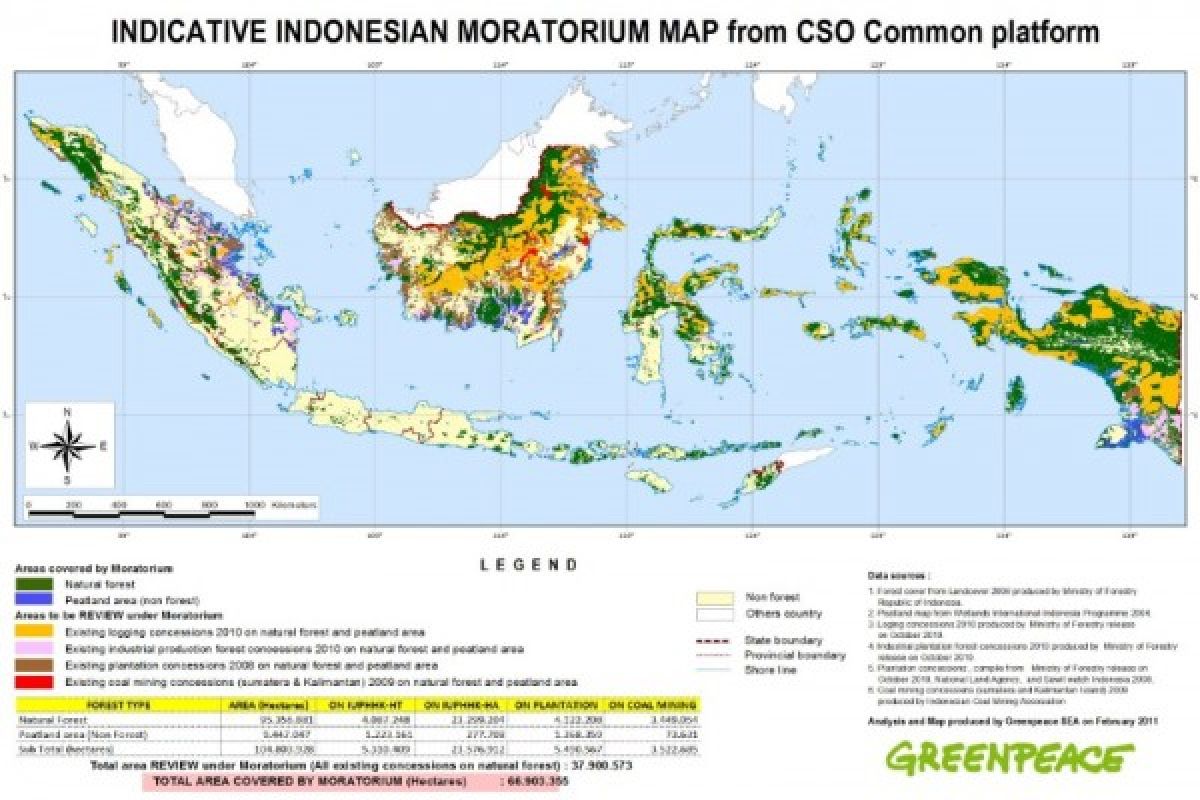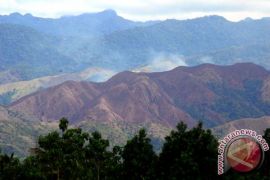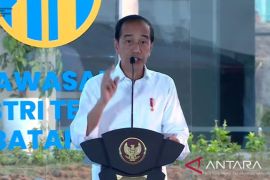We recommend the moratorium to be extended one or two more years...Jakarta (ANTARA News) - A number of non-governmental organizations have urged the Indonesian government to extend two-year moratorium on deforestation which will expire in May 2013, to protect the country`s remaining forests and peat lands.
In May 2011, President Susilo Bambang Yudhoyono signed long-waited Presidential Instruction No. 10/2011 on Moratorium on New Logging Concessions for Primary Forests and Peat lands, after a prolonged tug of war between environmentalists and business lobbyists.
Under the moratorium, no new licenses for logging concessions in parts of the country`s primary forests and peat lands can be issued.
The ban is also expected to support the government`s commitment to the reduction of greenhouse gas emissions by 26 percent (or 41 percent with international assistance) by 2020, compared to business as usual. The nation aims to achieve 87 percent of this goal by reducing emissions from deforestation and peat land conversion.
Today, after the moratorium has been implemented for almost two years, some experts and environmentalists, however, believed the regulation needs to be extended, tightened and expanded because there have been many compromises so far.
Coinciding with the commemoration of the Earth Day on April 22, 2013, Greenpeace called on President Yudhoyono to extend the moratorium.
Not only to extend it, the government should strengthen the moratorium and expand its forest cover because the ban has been rather ineffective so far, said Yuyun Indradi, Greenpeace Indonesia`s campaign coordinator.
The moratorium must be strengthened and extended for the sake of the climate, for the millions of people who depend on forests for their livelihood and for the survival of protected species threatened with extinction, such as Sumatran tigers, and orangutans, according to Greenpeace.
Previously, the Indonesian Environmental Forum (Walhi) also urged the government to extend the forest moratorium to prevent social and environmental conflicts in the future.
"If the moratorium is not extended, we are certain in the next five years, social and environmental conflicts would rise in the 25 million hectares of Indonesian forest area," Forest and Large Scale Plantation Campaign Manager of Walhi Zenzi Suhadi said.
The government should not only suspend the forest concessions, but also improve the management of forest and concession areas as well as impose sanctions against violators, Suhadi said.
He said the moratorium had not been effectively conducted as Walhi had found some attempts by local administrations and authorities to deceive the moratorium by proposing concessions for residential area.
A member of the State Audit Agency (BPK) in charge of environmental audit, Ali Masykur Musa, said the moratorium should be evaluated because it has been ineffective so far.
One of the aspects that need evaluation is the law enforcement against environmental destroyers, he stated.
Another call for the moratorium extension came from the National Strategy Working Unit of the Reducing Emission from Deforestation and Forest Degradation (REDD+).
"We recommend the moratorium to be extended one or two more years as the government is not ready to institutionalize the permit and management for forest utilization," spokesperson of the REDD+ Working Unit Mubariq said on a discussion on deforestation moratorium in early April 2013.
Mubariq said there were overlapping coordination in 15 state institutions regarding forest concessions. They even have different maps of forest concession areas.
Thus, the extension on the moratorium is needed to reorganize the management and the legal issues concerning forest concession right, as well as to finish the mapping in 11 prioritized provinces in the REDD+ program, Mubariq said.
In response to the calls from various parties, Indonesian Forestry Minister Zulkifli Hasan voiced the country`s commitment to extending the implementation of the moratorium.
He expressed the commitment when speaking in the tenth United Nations Forum on Forests (UNFF) held in Istanbul, Turkey, April 8-9, 2013, according to the forestry ministry in a statement recently.
During the 2009-2013 period, Indonesia has managed to reach averaged economic growth rate at 6.3 percent annually, despite the implementation of the moratorium, he said.
Indonesia has also managed to cut the deforestation rate from an average of 3.5 million hectares annually during the 1999-2002 period to around 450,000 ha during 2010-2011.
The forestry ministry is waiting for the President to make decision about the moratorium.
Recently, Environmental Affairs Minister Balthasar Kambuaya has expressed his support to the calls to extend the deforestation moratorium.
"The moratorium needs to be continued to protect our forests,"
the minister said here after launching "Towards Green Indonesia 2013" campaign on April 26, 2014.
Indonesia has the world`s third largest expanse of tropical forest after Brazil and the countries of the Congo basin.
The moratorium is applicable to primary forests and peat lands in conserved forests, protected forests, production forests and the other use area (APL). Logging concessions can still issued on secondary or degraded forests.
Based on the forestry ministry`s 2010 data, Indonesia has 64.2 million hectares of primary forests, 24.5 million hectares of peat lands. Meanwhile, 7.4 million hectares of peat lands are located inside primary forests. Secondary forests cover a total area of 36.6 million hectares.
According to the forestry ministry, the country has 294 forest concession right (HPH) holders occupying around 27.1 million hectare areas, with total log productions at about five million m3 annually.
It also has 244 industrial timber plantations (HTI) covering 9.8 million hectares of forest area, and with total productions at 14 million m3 per year; people`s plantation forest reserves covering 700,000 hectares; and people`s plantation forests covering approximately 12 million hectares with log productions at over 25 million m3 per annum.
Indonesia also has 354 primary forestry companies with total productions at 49.2 million m3 annually; seven pulp plants with total productions up to 8.5 million tons per annum; 1,257 furniture factories; 20 paper plants with total production at 10 million tons per year; and 2,500 building material factories. Over one million people are employed in the forestry sector.
Last year, Bogor-based CIFOR`s senior scientist Daniel Murdiyarso urged the government to continue to improve forest governance if the moratorium is to have a significant impact.
"Certainly improvement of the governance system is a long term thing. That is to say we [have to] manage forests differently, and that needs a lot of change, in terms of people`s mindset, the organisation, the institutions, the rules and regulations - there are a lot of things to be done," he said.
Washington DC-based World Resources Institute (WRI) recently analyzed the indicative moratorium map released by the forestry ministry in July 2011 and concluded that the moratorium in its current state will not contribute to Indonesia`s greenhouse gas emission reduction goal of 26 percent by 2020 as announced in 2009.
Although there are 43.3 million hectares (ha) of primary forests and peat lands and significant carbon stocks within the boundaries of the indicative moratorium map (IMM), the questionable status of secondary forests, the exemption of existing concessions, and the limited enforcement of the moratorium boundaries may result in gains being negated by other land-use emissions, according to WRI.
The WRI, however, believes that long-term positive impacts can still be achieved if significant governance reforms are accomplished during the moratorium period.
Mas Achmad Santosa, head of the Working Group for Legal Review and Law Enforcement on the Indonesian REDD+ Taskforce, agreed the moratorium should be extended.
"To achieve governance reform and consensus in forest related issues and natural resource management, it will take time. So two years is not enough," he said.
"We need to learn lessons from the past two years, we need to improve it, to sharpen it, and to be more specific what kind of reforms are needed," Santosa added.
(T.F001/B003)
Reporter: by Fardah
Editor: Priyambodo RH
Copyright © ANTARA 2013










